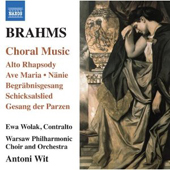
ESSENTIAL RECORDINGS

1) Ave Maria, Op. 12
2) Begräbnisgesang, Op. 13
3) Alto Rhapsody, Op. 53
4) Schicksalslied, Op. 54
5) Nänie, Op. 82
6) Gesang der Parzen, Op. 89
Someone in the production department at Naxos obviously put some thought and consideration in this well-planned grouping of some
of the best music for chorus and orchestra by Johannes Brahms (1833-1897). Not only are these some of the best from Brahms' output
in the genre, but they all seem to dwell on the same dark and foreboding subject matters of fate, destiny, death and ultimate redemption, and therefore come
together well to create a conceptual album if you will.
Written 10 years earlier than the famous German Requiem, it is clearly obvious that the Begräbnisgesang, Op. 13 (Funeral Hymn)
was an early essay or attempt at the genre, and was so deeply rooted in the composer's mind and already emotionally cogent, that most of its material became
the backbone of the Requiem. If you like the Requiem, this Op. 13 is like a condensed version of it. And if you asked people to name one of their favorite works
for voice, choir and orchestra, 9 out of 10 would probably mention the Alto Rhapsody, Op. 53, composed the year following
the German Requiem. Notice how Brahms creates a subtle mood shift from pathos to light over only three short paragraphs. Contralto Ewa Wolak
does a magnificent job here as her voice seems, like a chameleon, to take on and project the spirit in the words and music as it changes. The Warsaw Philharmonic Choir
also does a wonderful job as it enters quietly behind the contralto's voice and uplifts her spiritual journey to the end. Jump ahead to one of Brahms' final works
for chorus and orchestra, Nänie, Op. 82 (Lament), and the same assured hand leads the pen that put this music to paper. Brahms
always seemed to know exactly how to balance the orchestral and choral forces to the point where they merge together and blend into one, and nowhere is that
more obvious than in this beautiful work.
Conductor Antoni Wit leads exemplary and commendable readings of these pieces, exposing all of Brahms' darker colors, with here and
there, the luster of old burnished gold.
Jean-Yves Duperron - April 2012